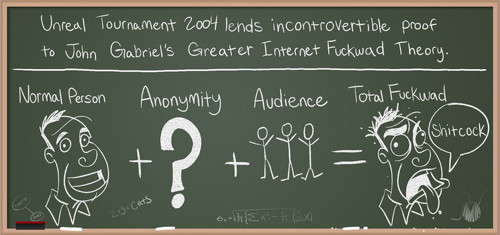On anonymous commenters
The problem with getting your news online is that there’s a real danger you might be exposed to the comments section. Now, I’ve been online a long time, and I’ve mixed things up on Usenet, mailing lists, hobbyist discussion boards, and blog comments, and I have never seen anything as ugly, as unintelligent, or as bigoted as the comments I’ve seen on places like The Globe and Mail’s and CBC News’s websites. Comments on news sites, as someone said in reply to one of my tweets, are “mostly whitenoise and claptrap from politicos and other nutjobs.” It’s almost enough to make me stop reading the articles themselves.
The problem seems to be the usual one: what happens when you let people sound off anonymously (see the classic and pertinent Penny Arcade comic above). It’s bad enough that some news sites are reconsidering allowing anonymous comments; in more than one case, they’ve been forced to disclose the identity of a commenter so that they could be sued for defamation.
But who are these nutjobs — these people who seem to spend their entire lives spouting invective online — anyway? The Boston Globe’s Neil Swidey explored the issue by interviewing a number of their website’s “heavy users.” Problematically, none of the outright trolls wanted to be interviewed: “But here are the people I didn’t hear back from: the screamers, troublemakers, and trolls (Internet slang for people behind inflammatory posts). Not a single one. The loudest, most aggressive voices grew mum when asked to explain themselves, to engage in an actual discussion. The trolls appear to prize their anonymity more than anyone else.” Because they’d turn to stone if they did, that’s why.
